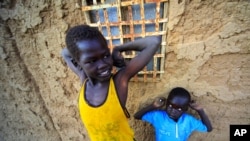The U.N. Children’s Fund warns Sudanese children are at high risk of becoming separated from families who leave their homes to take part in southern Sudan’s independence referendum. UNICEF says children are particularly vulnerable during large-scale population movements such as the one occurring right now in the Sudan.
The UN Children’s Fund urges Sudanese parents to keep a close eye on their children. It is calling on authorities in the north and the south to place special emphasis on monitoring and protecting separated and unaccompanied children, and reunifying them with their families.
More than 120,000 Sudanese have returned to the south from northern Sudan since mid-December to participate in the week-long independence referendum for the South, which began Sunday.
UNICEF spokeswoman Marixie Mercado says this large population movement already has had unfortunate consequences for dozens of children.
“To date, 57 children have been registered as separated from their families,” Mercado said. "UNICEF has supported the Ministry of Social Development in reunifying or re-establishing communication with families for 51 children and tracing and monitoring is underway for six.”
UNICEF reports just under half of Sudan’s 39 million people are children below 18-years old. Of these, six-million are under age five. Due to this very large youth population, the agency says the need for social services, health, education and protection is immense.
UNICEF estimates it will need more than $160 million for its humanitarian operations in Sudan this year. Mercado says the bulk of these funds will go for activities in the south.
“These funds will provide for humanitarian needs in health, nutrition, water, sanitation and hygiene, child protection, education, HIV, and non-food items-and to ensure that the rights of children are upheld, regardless of how the political situation evolves,” Mercado said.
After more than two decades of civil war between the north and the south, thousands of southern Sudanese are euphoric at the prospect of separating from the north.
But becoming a viable independent state will be a struggle. UNICEF reports southern Sudan has, what it calls, some of the scariest statistics in the world.
For example, it notes more than 90 percent of people live on less than one dollar a day. One out of seven women who become pregnant in Southern Sudan will probably die from pregnancy-related causes. One out of seven children will die before their fifth birthday.
UNICEF says overcoming these problems will take a lot of money and unswerving political commitment.
